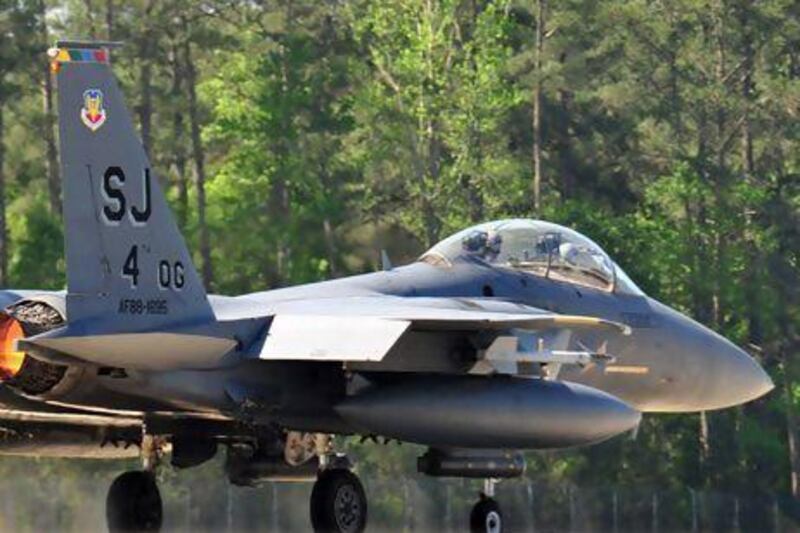ISTANBUL // Turkey's government hopes the expected punitive strikes by the United States against Syria will help to bring down Bashar Al Assad's regime.
Turkey's leaders, pointing to the burden of hosting half a million Syrian refugees, say they are ready to back US-led strikes to punish Damascus for the alleged use of chemical weapons against civilians on August 21, even without a mandate by the United Nations.
Although the US says the strikes are not aimed at regime change, Turkish leaders have called for more drastic action.
"A dictator who attacks his own people in a merciless way like this has to be stopped," Huseyin Celik, a spokesman of prime minister Recep Tayyip Erdogan's ruling Justice and Development Party (AKP), said this week,
"I hope that this pain will end and that Syria returns to normal."
Mr Celik's demand was echoed by Ahmet Davutoglu, the Turkish foreign minister, who said his country was ready to join an alliance against Syria.
"Turkey has been saying from the start that the international community must not remain an onlooker to the massacres by the Assad regime in neighbouring Syria," Mr Davutoglu told the Turkish Milliyet newspaper.
But analysts say there is uncertainty over the role Mr Erdogan's government would play in possible attacks. News reports say military and government targets in Syria could be attacked by cruise missiles fired from US warships and submarines in the eastern Mediterranean. The US would not need active Turkish assistance for those attacks.
Veysel Ayhan, director of the International Middle East Peace Research Centre, a think tank in Ankara, said Turkey was likely to secure coordination between the US and Syrian opposition forces and might allow the US to use the Incirlik airbase, about 100 kilometres west of the Syrian border, to launch attacks.
The airbase is a Turkish military installation, but has been used by the US for decades,
Once Syria's ally, Turkey turned its back on Mr Al Assad after the Syrian government fired against peaceful protesters after the country's uprising began in March 2011. Since then, Mr Erdogan has allowed the Syrian opposition to organise in Turkey and has allowed Syrian opposition fighters to use Turkish territory along the 900-kilometre border with Syria.
Ankara has long been calling for the creation of safe havens inside Syria to offer sanctuary to refugees.
The Turkish calls have been ignored, although US strikes could change the situation, said Mr Ayhan.
"Ankara hopes that this will open the door to further interventions," he said. "Once you have intervened for the first time, the idea of intervention is on the table. Once you have passed that, you cannot turn back and say you are not getting involved."
Mr Ayhan said an initial US strike would make it easier for countries like Turkey to take the initiative for other kinds of intervention, like the establishment of no-fly zones over parts of Syria bordering Turkey. That way, Assad's forces would be weakened further, making them more vulnerable to rebel attacks.
"It's not regime change, but it really is regime change," he said. "Because you tell the regime: you cannot do this and you cannot do that."
A western diplomat in Turkey also said Ankara was hoping that a US strike would mark the beginning of the end of the Assad government. "But that may be wishful thinking," the diplomat said.
Mr Erdogan's stance on Syria is also facing challenges at home. Tapping into a trend of anti-Americanism in parts of the Turkish public, critics accuse the prime minister of acting like a subcontractor for the US government in the Syrian crisis.
In a poll for the Marshall Fund last year, 57 per cent of respondents in Turkey said they had an unfavourable view of the US. Some Turkish leftists and nationalists say Washington seeks domination of the Middle East.
Faruk Logoglu, a high-ranking member of the opposition Republican People's Party (CHP), said Western countries used the allegation of chemical weapons use by the Assad government "as reasons for war and occupation" in Syria.
"The AKP should listen to the Turkish people, not to the wishes of the West" and should keep its distance from military action in Syria, Mr Logoglu said. The CHP is calling for a parliamentary vote on Turkey's participation in western strikes.
Mr Ayhan, of the International Middle East Peace Research Centre, said the Syrian crisis could become a serious domestic headache for Mr Erdogan ahead of local and presidential elections in Turkey next year if the expected US strikes went wrong.
"If many civilians die, it may become a domestic issue" in Turkey, Mr Ayhan said.
tseibert@thenational.ae
twitter: For breaking news from the Gulf, the Middle East and around the globe follow The National World. Follow us





